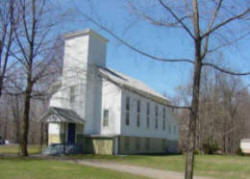Baron Steuben Lodge #264
5559 Lee Center-Taberg RoadLee Center, New York 13363
Stated Communications 2nd & 4th Wednesdays
Photo courtesy of R:.W:. John R. Gilbert
Spring 2000
The History and Organization of Freemasonry
No one knows with certainty how or when the Masonic Fraternity was formed. A widely accepted theory among Masonic scholars is that it arose from the stonemason guilds during the Middle Ages. Much of the language and symbols used in the fraternity’s rituals come from this era.
Although not a Masonic document, within the Concilium Avenionense, circa 1326, the Church attacks secret societies, describing them with such words and phrases as fraternal assistance, signs, tokens, obligations and the election of Masters.
The first record of an initiation into an English lodge was made by Elias Ashmole, who noted in his diary on October 16, 1646, that he and a Colonel Henry Mainwaring had been initiated into a non-operative lodge. However, Ashmole doesn't mention the lodge again until March 11, 1682.
On June 24, 1717, four of the lodges operating in London met together to form the first Grand Lodge of England. It became the first administrative or policy-making body of Freemasonry, and records from that point on are more complete. Within thirty years, the fraternity had spread throughout Europe and the American Colonies.
Freemasonry became very popular in Colonial America. George Washington was a Mason, Benjamin Franklin served as the head of the fraternity in Pennsylvania, as did Paul Revere and Joseph Warren in Massachusetts. Other well-known Masons involved with the founding of America included John Hancock, John Sullivan, Lafayette, Baron Fredrick von Steuben, Nathaniel Greene, and John Paul Jones.
About one hundred old manuscripts located in various places are known as the "Gothic Constitutions" or "Old Charges". They exist as the earliest written proof of modern Masonry. The most prized is the "Regius Manuscript" which takes its name from the fact that King George II presented it to the British Museum in 1757. Composed circa 1390 A.D., written in verse, it is the oldest preserved Masonic writing. The" Cooke Manuscript", circa 1400-1410 A.D. was also written for Masons and contains evidence of having been copied from earlier works.
The Cooke Manuscript begins with the Masonic practice of invoking the blessing of Deity and ends with the familiar "Amen, so mote it be." It contains a legendary history of the craft and the guild's regulations or charges. These Ancient Charges form the basis of our present day rituals and include the following directions:
The initiate was instructed to take his oath while his hand was "under the holy booke" or "upon the booke." It was his duty to keep the counsel of his fellows truly, not to commit adultery with a fellow's wife, daughter or servant, not to supplant a master or fellow in any of their work. He was not to take an apprentice unless he be freeborn, come of good kindred, and whole of limb and to slander no Mason behind his back. He was to come to Assembly if it is within fifty miles if he have warning.
These Charges were to be read at each assembly of Masons and were often accompanied by lectures on the history of the craft or some appropriate Masonic subject. Later, these requirements were adopted in every well governed Lodge and much of what goes on in Masonic Lodges today stems from the manner in which these requirements were observed from that time.
Over the centuries, Freemasonry has developed into a worldwide fraternity emphasizing personal study, self-improvement, and social betterment via individual involvement and philanthropy. During the late 1700s it was one of the organizations most responsible for spreading the ideals of the Enlightenment: the dignity of man and the liberty of the individual, the right of all persons to worship as they choose, the formation of democratic governments, and the importance of public education. Masons supported the first public schools in both Europe and America. During the 1800s and early 1900s, the government provided no social security or welfare benefits. The Masonic tradition of founding orphanages, homes for widows, and homes for the aged provided the only means of security many people knew.
Today our rituals stand as some of the greatest material in literature. It is a noble conception from the mind of Man and serves to teach the recipients some of the finest standards that a man should choose to live his life by. So long as the soul of Man aspires to fulfill its destiny in heaven, the teachings, ideals and philosophy of Masonry will serve to instruct. It is given to every Mason to preserve its Ancient Usage's and Charges inviolate, and pass them to the awaiting generations with pride and excellence.
[ Back to top ]
